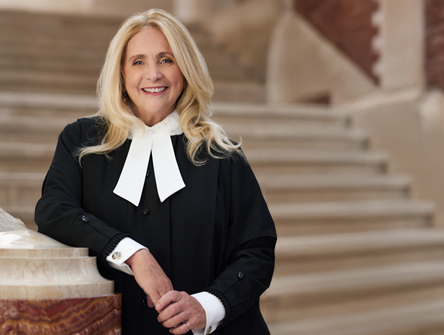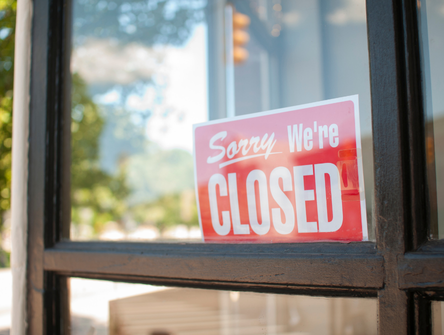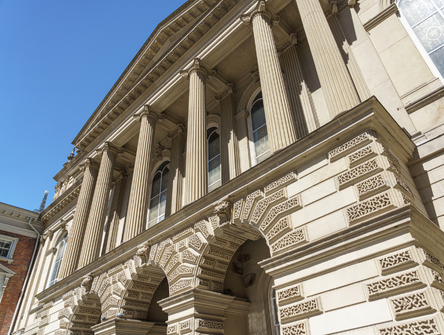The harm done
How the dissent in the Ward ruling could influence the debate around legislation on harmful content online.

The Supreme Court of Canada's 5-4 decision in the Mike Ward case is being hailed as both an affirmation of the rights of freedom of expression. But it has also alarmed some critics who warn that the dissenting judges have thrown their weight behind a worrying trend toward censorious disapproval.
All of this is happening at a time where words are being equated with violence in online discourse.
While the case centred around comedian Mike Ward mocking a young celebrity in Quebec, who had a physical disability, the majority of the judges wrote that the case was not applicable solely to the province and the Quebec Charter of Human Rights and Freedoms.
"[The court] stepped away from the theory that Quebec is different – for fundamental rights, Quebec is the same," says Montreal lawyer Julius Grey, who represented Ward. "In Vriend, the court inserted a section into the Human Rights Code of Alberta to protect gays and lesbians. Each province has its peculiarities, but on the whole, it's the same."
Kerri Froc, a law professor at the University of New Brunswick, agrees that the scope of the decision is noteworthy.
"It's giving pretty big signals that this is not to be confined to the Quebec situation, and that it's really meant to be guidance for tribunals and courts across the country in how to interpret their various provisions," she says.
Even so, says Grey, the court does not give artistic freedom any special treatment, adding that it needs to be interpreted broadly so that people take on society's "sacred cows," as Ward did.
"Freedom of expression isn't necessary when you want to say motherhood and apple pie," Grey says. "It's only necessary if you want to say something that's going to bother somebody, and somebody is going to jump up and say that you can't say that."
What's more, the judgment also dealt with the notion of discrimination and dignity, where the Supreme Court took a narrow view.
"For dignity, it's not enough to make fun of somebody – it needs to dehumanize them, or lead to hate," says Grey. "The mere subjective sense of having been insulted, humiliated or undervalued is not sufficient to create discrimination or to be a real affront to dignity. As for discrimination, if speech by itself is discrimination, then there is very little scope left for freedom of expression."
In its decision, the court used the standard elaborated in Whatcott regarding hate speech to interpret the Quebec Charter in a way that doesn't run afoul of constitutionality, says Froc.
"In Whatcott, when they were looking at the Saskatchewan Human Rights Code, they severed portions of that legislation that talked about more modest provisions around hurt feelings, humiliation or offensiveness, and left the more extreme emotions that were to be dealt with in that," she says. "We're interpreting this in a reasonable way, but in a way that is constitutionally compliant."
Of course, there is no right to be protected against offence, she adds. Where the majority and the dissent part ways is on the issue of prohibited harm. For the majority, the prohibition is inciting others to vilify people or detest their humanity, will can lead to discriminatory treatment. The dissent is also concerned about the impact on mental health or causing emotional harm.
"We seem to be in a place in our culture where we conflate harm with offence or emotional upset," says Froc. "This is a clear statement from the court saying we have to pull back from that."
"The litmus test is its likely effect on third parties."
According to Grey, freedom of expression has been "taking a beating" in the popular discourse for several years, and that the Supreme Court has reinforced the fundamental liberties.
"All of the fundamental liberties can be used for things which may well be unpleasant to many, but they are still there, and they need to be permitted excepted in those extreme cases," he says. "I think the majority of the Supreme Court is attempting to arrest the decline of the fundamental liberties and to say that various identity goals or policies are not more important than those fundamental rights."
Froc also notes that the court has previously tried to include dignity as part of their Charter Section 15 analysis and have since pulled back from that as dignity became too subjective of a measure.
"You have the judiciary, which isn't representative, telling claimants from marginalized communities what they should or should not feel about how a provision impacts their dignity," says Froc. "From a rule of law perspective, what is the test? What the court is saying about dignity is it's trying to put some meat on the bone here. They're saying it can't be assessed in a purely subjective way, and it's putting that a very high bar – it has to be about personhood and de-humanization."
Grey, who remarks that he has been on both sides of 5-4 decisions, says the dissenting judgment still needs to be treated with respect, as it may contain the seeds of future changes. Also, dissenting judges show us what's at stake and put cases in perspective.
Emmett Macfarlane, a political science professor at the University of Waterloo, is particularly concerned that four judges on the court favoured limiting free expression when the government promises sweeping reforms to regulate online hate. The Ward ruling hardly gives Parliament good guidance for such legislation, he says.
"Before [this decision], we might have said that if the government casts this net too broadly in an online context, it's going to run into constitutional trouble," says Macfarlane. "Now, I would be a lot less certain of that given the willingness of four of the judges to accept a fairly nebulous set of provisions in the Quebec Charter that implicated really offensive speech."
Macfarlane adds that it was difficult to apply a discrimination context to this case as it was not a case of someone being denied a service or employment. Rather, he was subject to cruel, mocking jokes.
"The fact that the court was so sharply divided puts free expression in a more precarious state of legal protection in this country," says Macfarlane. "Some of the comments the comedian made were horrible and deeply offensive, but if they are neither hate speech or defamatory, nor did they rise to the level of criminal harassment, then what is the basis for the state sanctioning that speech? The answer from the dissenting judges is that the speech was just discriminatory, and I'm not aware of a context where we have punished discriminatory speech that's not connected in some way to explicit discriminatory actions."
Macfarlane says that this raises the level of uncertainty in terms of the broader notion of free expression and protections for it, particularly as lower court judges are likely to mine the dissent when it comes to the challenges of the future online harm legislation.
"They can distinguish what's before them with what the majority might have said about this particular case and say, in this instance, the dissenting judgment at the Supreme Court level is more persuasive because I have these distinguishing facts that allow me to depart from the Supreme Court majority holding," says Macfarlane. "A dissent at the Supreme Court level is a bit of an invitation or opportunity for other judges to grab onto something as justification for departing from precedent."
According to Froc, it's worth thinking about the extent to which discriminatory expression is comparable to hateful expression. She isn't certain whether the majority did a good job in delineating the difference between a hate speech provision and a provision that prohibits expression likely to cause discrimination.
David Matas, senior legal counsel of B'nai Brith Canada, who represented the group as intervenors before the court, says that his clients were disappointed in the result. They see a gap in the law that doesn't include discriminatory discourse.
"The obligation to prohibit or stand against discriminatory discourse is in the Universal Declaration of Human Rights, and we see it in other countries, like Belgium," says Matas. "We could enact such laws, but we don't have them. Ideally, to be comprehensive, they should be part of the human rights laws."
The Ward ruling highlights this problem, where something can be discriminatory even if it's not hate speech, he says.
"The dissent highlights that the present law doesn't allow a legal stance against discriminatory discourse," says Matas. "Our laws talk about incitement to hatred, but not about incitement to discrimination."
Ward's comments amounted to incitement to discrimination, in his view. Enacting laws would create a national conversation about what this kind of incitement is - something he hopes will be debated regarding the "new" Section 13 of the Canadian Human Rights Act, which the government tabled in Bill C-36 in the previous Parliament.
"There was a problem with the old Section 13, and I wasn't sorry that it was gone, but it needed to be replaced with something else," says Matas. "What was wrong with the old one was not the concept, but it was the absence of procedural safeguards. I would say the same about incitement to discrimination. When you're dealing with discriminatory discourse, you're dealing with speech, so you need to be as concerned about freedom of speech as about discrimination."
Matas doesn't believe that the balance means abolishing one in favour of the other, but that an appropriate balance would have those procedural safeguards to prevent people from engaging the system over something they found personally offensive.
"These balances can be reached, and these safeguards can be put into place, and we don't simply have to say all speech goes simply because any speech restraint is going to be an undue restriction on freedom of speech," says Matas.


